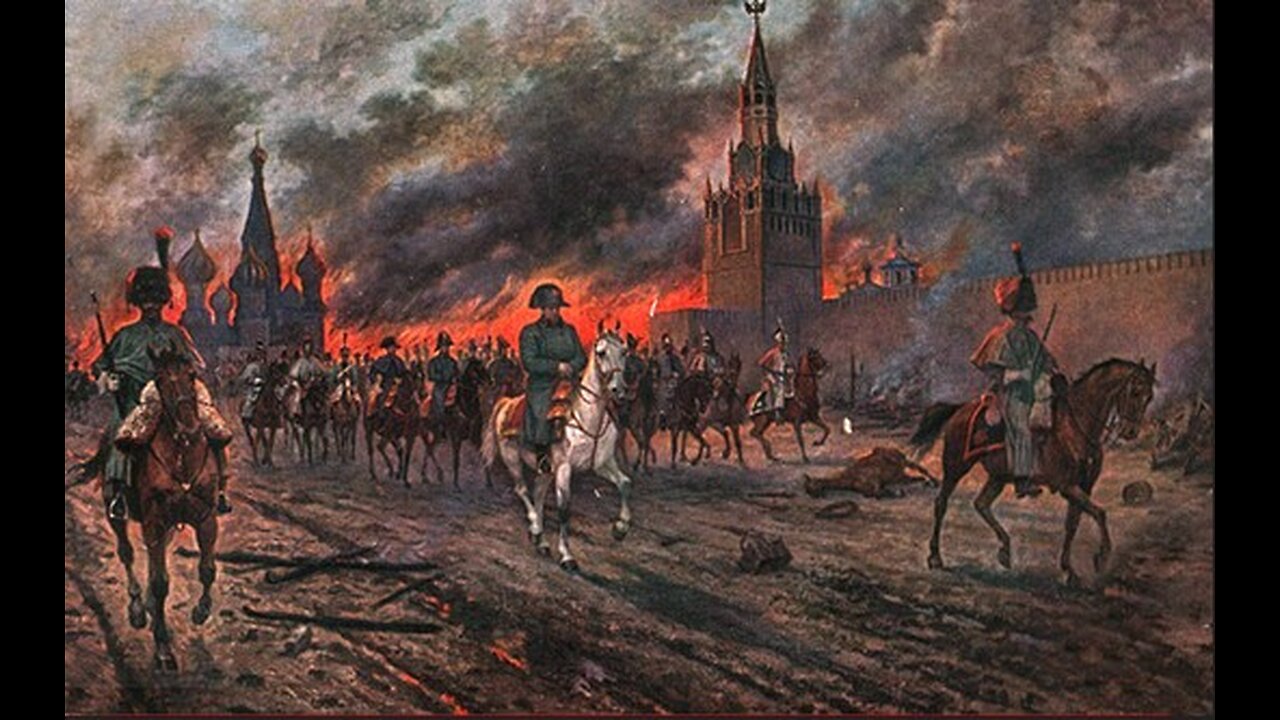Premium Only Content

Napoleon Bonaparte's Celestial Fate: Mars, the Sun, and Neptune's Influence on His Rise and Fall.
VIDEO TEXT:
Napoleon Bonaparte was born in Ajaccio, Corsica, France, on August 15th, 1769, and died 51 years later on May 5th, 1821, in Longwood, on the British island of St. Helena. St. Helena, one of the most remote islands on Earth, is located 1,200 miles west of Angola and 1,800 miles east of Brazil. It served as a super-prison built by the British specifically for Napoleon.
Based on my analysis of Napoleon Natal chart, his life and destiny were influenced by three key planets.
The first key planet influencing Napoleon Bonaparte's destiny was Mars, located in the 11th house of friendship and community. Interestingly, the positioning of Mars in his chart mirrors that of Carl Jung, another prominent figure born under an almost identical celestial alignment. I'll include a link in the video description to where I analysed Carl Jung's natal chart. With Planet Mars positioned in the 11th house, it guaranteed Napoleon not only the backing of his influential friends, it also allowed him to exercise on his drive for conflict without restraint, planet Mars aggression and warlike fuelled Napoleon's rise to power.
From a young age, Napoleon's life was marked by military ambition and achievement. At the tender age of 10, he was enrolled as a cadet at the military academy of - Brienne-le-Château. By the age of 16, he graduated from the academy and was commissioned as a second lieutenant in the artillery. Planet Mars' influence was evident and beneficial throughout Napoleon's early career, culminating in his appointment as a general of France at the young age of 26. Planet Mars can easily shape a person's destiny, especially when its aggressive inherent traits align with the individual's vocation.
The Sun and Neptune in his 10th house are the other two planets shaping Napoleon's destiny. The Sun is placed right in the center of the 10th house, and Neptune, is placed almost exiting the same 10th house, of Career Authority and Fame. The Sun granted Napoleon a strong sense of self-expression and charisma, while Neptune cast an illusory fog that ultimately contributed to his downfall. Napoleon's clarity of purpose and identity began to be clouded by Neptune's influence as he assumed the role of emperor in 1804 at the age of 35. This shift in his leadership from soldier to policy maker was deeply marked by periods of triumph and confusion.
As emperor, he found himself increasingly constrained by the responsibilities of governance, leading to restlessness and strategic errors. His expansionist ambitions, which initially brought him great success, eventually contributed to the erosion of his empire. The transition from military leader to emperor highlighted his internal struggle between identity and ambition. Neptune urged him to become a shady politician, while Mars drove him to be blunt and aggressive, creating a major conflict within his psyche.
Napoleon's downfall can be attributed to his unchecked drive for conquest, fuelled by planet Mars.
The Sun shone brightly and undisturbed over Napoleon for 26 years until he became general of France by the end of the 18th century. As he took the role of emperor 8 years after in 1804, France was powerful, wealthy, and pretty much in control of all Europe, including Spain, Italy, the Austrians, the Danish and the Russian as an ally. Napoleon could have decided to enjoy life and become a shady cagey politician, but Mars did not allow him.
Napoleon's Sun-given brightness was clouded by Neptune the moment he tried to identify himself as an emperor. He didn't like the routinary duties of an emperor, leading to confusion and restlessness. He struggled with the boundaries between being an emperor and being a born warrior making him susceptible to daydreaming and fantasy.
Napoleon died in complete confusion. That's why the British sent him as far away as possible, to a place from which he could not escape literally in the middle of nowhere. His impulsiveness, dictated by Mars, remained with him until his last day, posing a perpetual threat to peace in Europe. His downfall and main error were not balancing his drive-to-kill energy. I venture to affirm that in astrological terms he was physically driven by Mars, divinely inspired by the Sun, and led to delusion by Neptune. Napoleon’s personal growth strategy failed when he repeatedly chose Mars’ influence over Neptune’s shady and cool influence, a tragic strategic error that lasted 17 years from 1804 until his death as a captive in exile in 1821. Thank you.
-
 LIVE
LIVE
Viss
1 hour ago🔴LIVE - PUBG Solo Tactics To Win Consistently! - PUBG 101
161 watching -
 LIVE
LIVE
Steven Crowder
3 hours ago🔴 Live Reaction: RFK Faces Senate Grilling After Employees Demand His Resignation
22,956 watching -
 1:02:58
1:02:58
The Rubin Report
2 hours agoPress Stunned by Trump’s Brutally Honest Message for Elon Musk
26.9K30 -
 LIVE
LIVE
Rebel News
20 minutes agoPolice chief says 'comply' with intruders, Carney on temp workers, Trump on tariffs | Rebel Roundup
232 watching -
 LIVE
LIVE
Neil McCoy-Ward
1 hour ago🚨 Hospitals Are Bracing For MASS Casualties...
83 watching -
 LIVE
LIVE
The Mel K Show
1 hour agoMORNINGS WITH MEL K - NATO Cognitive Warfare & Post WWII Betrayal Finally Exposed 9-4-25
814 watching -
 LIVE
LIVE
The Shannon Joy Show
3 hours agoCOVID Not A ‘Lab Leak’, It Was Created At UNC Chapel Hill! LIVE - Exclusive With Dr. David Martin
332 watching -
 LIVE
LIVE
LFA TV
6 hours agoLFA TV ALL DAY STREAM - THURSDAY 9/4/25
4,017 watching -
 59:56
59:56
Grant Stinchfield
1 hour agoGas Prices Broke Him – Newsom Quits the Fight!
3.51K5 -

Trumpet Daily
1 hour agoTrumpet Daily LIVE | Sept. 4, 2025
3.51K1